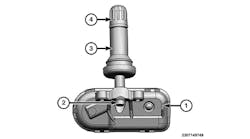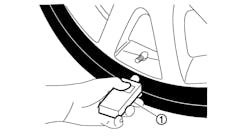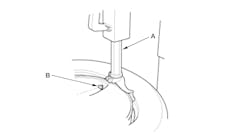SUBJECT VEHICLE: 2007-09 Jeep Wrangler.
SENSOR IN TIRE? No (sensors are mounted wheels).
RESET PROCEDURE? No.
SPECIAL TOOL NEEDED? No.
The Jeep Wrangler’s tire pressure monitoring system (TPMS) uses radio and sensor technology to monitor air pressure levels. Sensors are mounted to each wheel as part of the valve stem and broadcast tire pressure data to a central receiver circuit inside the Wireless Control Module (WCM). If a low pressure condition exists, the WCM will send a request to illuminate the low pressure warning light and to sound a chime.
The sensors lay dormant in Park Mode when the vehicle is not in motion. When the Wrangler starts moving and reaches speeds of more than 15 mph, the sensor begins sending data. Follow these steps to remove an old sensor and replace it with a new one:
1. Remove the tire and wheel assembly.
2. Demount the tire from the wheel following the tire changer manufacturer’s specifications. When breaking the bead loose from the wheel, do not use the bead breaker in the area of the sensor.
3. Using a thin-walled socket, remove the special nut retaining the sensor to the wheel. While doing this, hold the pressure against the rear of the metal valve stem to keep the valve stem from pushing backwards, which could damage the antenna strap.
4. Remove the sensor.
[PAGEBREAK]
Remember that to prevent contamination from entering the valve stem, the cap used on the stem contains an “O” ring seal. Retain the original valve stem cap for re-use. A regular valve stem cap cannot be used as a substitute. Always reinstall the original valve stem cap. Now you’re ready to install a new sensor:
1. Wipe the area around the sensor/valve stem mounting hole, making sure it’s clean. Also make sure the wheel’s surface has not been damaged.
2. Insert the sensor through the wheel and keep pressure against the rear of the metal valve stem. The potted side of the sensor should be positioned toward the wheel. Do not attempt to mount the sensor otherwise or damage may occur.
3. Install the sensor nut by hand.
4. Using a thin-walled socket, tighten the nut to 71 in.-lbs.
5. Mount the tire on the wheel and adjust air pressure to specification. Make sure the original valve stem cap has been securely installed.
6. Install the tire and wheel assembly on the Wrangler.
7. Drive the Wrangler for a minimum of 10 minutes while maintaining a continuous speed of 15 mph or higher.
During this time, the sensor will learn the new sensor ID code.
Points to remember
Although the Jeep Wrangler’s TPMS does not require a formal retraining process above and beyond the aforementioned step #7, there are a number of things to keep in mind when servicing the system.
The Wrangler’s TPMS has been optimized for original equipment tires and wheels, and TPMS pressures have been specifically established for the tire size that comes OE on the vehicle. Sensor damage may result when using replacement tires that aren’t the same size and type as the OE tires. In addition, aftermarket wheels can cause sensor damage. The Wrangler’s wheels and tires have been match-mounted at the factory. Before demounting a tire from the wheel, a reference mark should be placed on the tire at the valve stem location to ensure that it is remounted in the original position on the wheel. The use of tire sealants is prohibited for vehicles equipped with TPMS.
Before installing the replacement sensor, make sure you have the correct sensor. Sensors can be identified by a white outline oval insignia on the sensor body. ■
Information for this column comes from Mitchell 1’s ”Tire Pressure Monitoring Systems Guide” for domestic and import vehicles through 2009. Headquartered in Poway, Calif., Mitchell 1 has provided quality repair information solutions to the automotive industry for more than 80 years. For more information, visit www.mitchell1.com.




